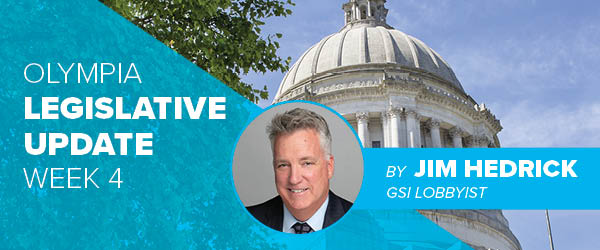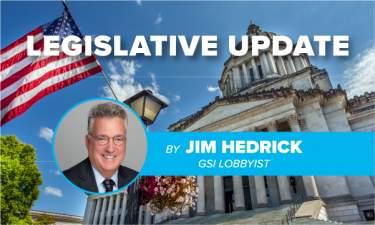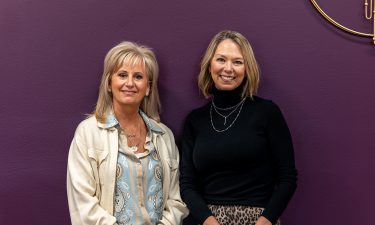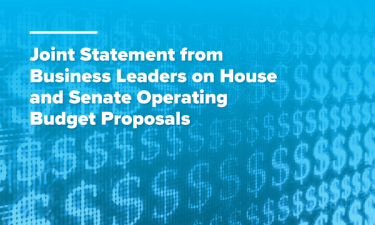By Jim Hedrick, GSI WA State Lobbyist and Spokane Regional Advocate

Workforce, or the lack thereof, has dominated legislative discussions as one unforeseen consequence of the COVID pandemic. Washington employers in every sector continue to tell legislators that hiring is a continuous struggle and is affecting manufacturing production, construction, meeting demands for goods and services, and especially access to health care. This past week the legislature saw public committee hearings on several bills designed to put more workers into the workforce, responding to bipartisan concerns about insufficient staffing across sectors including health care. HB 1547 by Rep. Michelle Caldier (R-Gig Harbor) authorizes an out-of-state health care provider to practice in Washington upon submission of credentialing information by a health care entity; SB 5498 by Sen. Mark Mullet (D-Issaquah) would create a hospital-based nurse student loan repayment assistance program; and SB 5582 by Sen. Jeff Holy (R-Spokane) creates a new development pipeline for nurses.
However, one of the hardest-fought bills historically in Olympia continues to be the Nurse Licensure Compact (NLC). Long before COVID, proponents of the NLC have supported legislation to authorize a multi-state license for nurses registered or licensed in other states and that participate in the NLC to practice in Washington State, waiving the need to go through the certification process of getting a Washington State nurses license. During the COVID pandemic, Governor Inslee in an emergency proclamation relaxed state regulations to allow out-of-state licensed nurses to practice in Washington immediately. So, this year many in Olympia thought the NLC legislation would have an easier pathway to passage; not so much.
Friday of this week the House Committee on Postsecondary Education and Workforce took an hour of public testimony on House Bill 1417 sponsored by Rep. Mike Volz (R-Spokane) that would enact the NLC which has now been enacted by 39 states. Volz in his remarks stated, “this bill is not in isolation and does not solve the nursing shortage but is a part of a solution and is a pathway to bring nurses into Washington and gives nurses more flexibility.” Testimony to support the bill was given by the Washington State Hospital Association (WSHA), Washington Policy Center, and a community panel from Spokane speaking to the issue of military spouses, many of whom are licensed nurses and would benefit from a seamless work transition when transferred around the country. Military spouses are experiencing lag times and barriers to getting work in Washington, having to go through the state’s credentialing process.
Opposition to the bill comes from nurses’ labor unions who say the NLC has not proven to increase the number of nurses in other states, compact nurses cannot be tracked and their backgrounds certified, and without proper supervision places patient safety at risk.
The Senate version of the NLC bill, SB 5499 (Mullet), is scheduled for public hearing next week in the Senate Health and Long-term Care Committee. Historically the measure has received more favorable attention in the Senate.
On Tuesday, HB 1335 (Hansen, D-Silverdale) relating to the practice of doxing was heard in the House Civil Rights & Judiciary Committee. The bill follows legislation in six other states by prohibiting the publication of an individual’s personal identifying information without consent when the publication is with the intent or knowledge that the information will be used to harm the individual or that the publication causes harm. The bill also includes a civil cause of action for violations. Supporters point to the doxing of nurses, teachers, and public officials. The bill did not receive opposition in the hearing.
The Senate Labor & Commerce Committee heard the 2023 version of a policy designed to regulate employee safety at warehouse distribution centers this week. Similar to the 2022 bill, SB 5348 (Conway, D-Tacoma) would require notification of quotas upon hire and at least every year. Employers could also not require a quota that conflicts with meal or rest breaks or exposes the employee to hazards. Supporters of the bill say workers in fast-paced, highly automated settings get injured at higher rates. The Association of Washington Business testified in opposition, saying the bill is overly broad and that these decisions should remain at the warehouse level, without L&I’s involvement.
Both House and Senate committees heard testimony this week on the bipartisan “Right to Repair” legislation sponsored by Rep. Mia Gregerson (D-SeaTac) and Sen. Derek Stanford (D-Shoreline). Under HB 1392 / SB 5464, cellphone, computer, and tablet manufacturers must make available the same documentation, parts, tools, and patches to certified independent repairers and owners that they provide their authorized repairers. In committee, legislators heard support from repairers, school districts, and environmentalists. Technology industry representatives testified in opposition, saying the bill could cause safety, privacy, and security risks and that manufacturers have already expanded opportunities for independent repairs.
The House Appropriations Committee heard HB 1258 Rep. Cindy Ryu (D-Seattle) on Wednesday, which increases statewide tourism funding in the State of Washington by increasing and reinvesting the existing sales tax on tourism-industry sales such as rental cars, hotel nights, and restaurants. Supporters pointed to lagging group convention and business travel, which has previously accounted for two-thirds of travel business to Washington. Washington’s tourism agency is currently the least funded in the United States. The bill did not receive opposition in committee.
On Friday morning, the House State Government and Tribal Relations Committee heard HB 1541 by Rep. Darya Farivar (D-Seattle). The policy, known as the “Nothing About Us Without Us bill” implements membership requirements for statutory entities (task forces, work groups, advisory committees, etc.) tasked with examining policies that directly and tangibly affect a particular underrepresented population. The phrase “nothing about us without us” is a mantra that has historically resonated with the disability rights community in advocating for full and direct participation in all decisions that impact their lives.
The committee phase of the legislative process has two more weeks until the policy committee cutoff on Friday, February 17. Until then, committees will be using their time in what is called ‘executive session’ where committees caucus (private meetings by party), debate and amend bills, and vote them out of committee. The time for taking public testimony is dwindling as is the volume of bills being introduced.
Next week the Senate Law & Justice Committee will take testimony on four bills to address the Blake decision concerning the decriminalization for possession of counterfeit drugs.
For More Information
Public Policy developments change fast. Note this is a wrap-up of the week of January 30-February 3. You can find prior week wrap-ups here: January 23-27, January 16-20, and January 9-13. Check out GSI’s 2023’s State Agenda. For more details about any of the bills in this article, visit the Washington State Legislature page to search by bill number. For more information contact Jake Mayson, Director of Public Policy.




